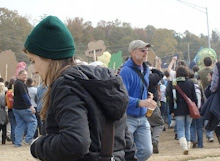
Amnesty Internationale's Demand Dignity Campaign is the newest and, I believe, the most progressive pursuit of activism for the NGO since the organizations inception. Demand Dignity is a frame shift for AI's approach to protecting human rights.
Demand Dignity focuses on poverty. From DC to Mumbai, Dignity is Amnesty's first international campaign that fights for the importance of economic, social and cultural rights for all people.
The campaign makes maternal mortality, housing and slums and corporate accountability central to this years activism. In the US there are plans for a renewed push for the US to sign CEDAW and volunteers abroad will work on the ground with communities bringing attention to clear cases where peoples natural rights have been ignored, leaving them without access to proper health care, water or shelter.
Demand Dignity blends the zone of human rights with sustainable development, women's rights and other specialized fields like health and environmental protection.
The fact is, human rights activism is a field of work that almost naturally connects within a broader framework of development. Yet looking at AI's history until the late 90s the organization categorically chose to focus on individuals suffering at the hand of terrible government regimes and cases that were emblematic of larger problems rather than the problems themselves. AI has brought great awareness to global problems but groups like OxFam and Doctors without Borders are often the organizations that tackle the larger issues that bring about the cases of wrongful imprisonment, torture and violence.
Amnesty first appeal to the western world's belief in the importance of human rights came in the form of civil and political rights. The idea of getting public support for individuals at risk and pressuring governments to release prisoners of conscious gained success due to the western public's support of individual rights that they viewed inherent to "good government" and "democratic freedom."
From this beginning, AI expanded. The organization made the move to expand the protection individuals, not only those in prison, but also people subjected to violence, disappearances and intimidation by their government. Later this premise of defending those who are subjected to state abuse went to the local level - the systemic issues of violence - the home, domestic abuse and the protection of women. Moving from individuals to communities, torture to all violence, AI continued to expand its work.
It is from this transformation that AI reached the campaign it champions in 2009.
Poverty disempowers citizens. It fosters discrimination between classes, races and cultures. Without resources, health or hope that circumstances will change, poverty enables violence, substandard medical practices, non-government/informal sector control of resources leading to gangs and the ghettoizing of communities.
Poverty is the root of human rights violations. If communities, nations or individual are unable to participate or be recognized by a political system, and due to their economic status, be denied decent levels of shelter, health care, food, clean water and safety, then there is no way to move forward in the protection of human rights.
Amnesty has taken a bold and necessary step in calling for action in its campaign for Dignity. Truly recognizing the important roles of poverty and development in the protection of human rights
listen to secretary general of AI - Irene Khan talk about her new book on poverty on Democracy Now

No comments:
Post a Comment